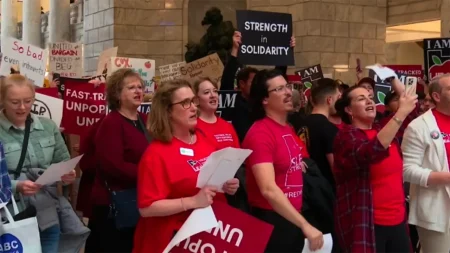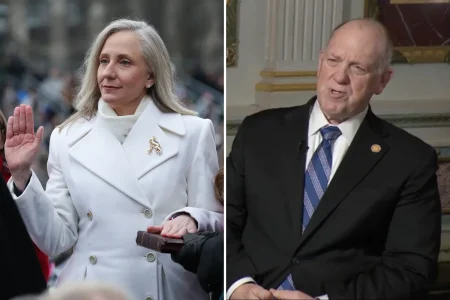Britain’s Rwanda Migration Plan Faces First Legal Challenge in High Court
Historic Treaty Challenge Puts UK Government’s Cornerstone Migration Policy to the Test
In a significant development for the United Kingdom’s controversial immigration strategy, the first legal challenge to the Rwanda deportation treaty has reached London’s High Court. The case represents a critical juncture for Prime Minister Rishi Sunak’s administration, which has positioned the policy as the centerpiece of its approach to deterring irregular migration across the English Channel. As small boats continue to arrive on British shores, the legal battle has profound implications for the government’s pledge to “stop the boats” and the thousands of asylum seekers who could potentially be removed to Rwanda under the scheme.
The challenge specifically targets the treaty negotiated between the UK and Rwanda, which forms the legal foundation for the government’s plan to transfer asylum seekers who arrive in Britain via unauthorized routes to the East African nation. Designed to reduce the dangerous small-boat crossings that have claimed numerous lives in recent years, the policy has been contentious since its inception under former Prime Minister Boris Johnson. Human rights organizations, immigration advocates, and opposition politicians have consistently questioned both the legality and morality of sending vulnerable individuals seeking protection to a country thousands of miles from Britain. The current case marks the first time the treaty itself, rather than just the broader policy, has been subjected to judicial scrutiny at the High Court level.
The Legal Arguments and Human Stakes Behind the Challenge
At the heart of the legal challenge is whether Rwanda can be considered a safe country for asylum seekers and whether the treaty provides sufficient safeguards to protect the rights of those who would be transferred there. Lawyers representing the claimants—a coalition of asylum seekers potentially facing deportation and rights organizations—argue that the agreement fails to establish adequate mechanisms to prevent refoulement, the prohibited practice of returning refugees to countries where they may face persecution. They contend that despite the government’s assurances, Rwanda lacks the legal infrastructure and practical capacity to process asylum claims fairly and to provide lasting protection to those in need.
The government’s legal team has vigorously defended the treaty, maintaining that it contains robust safeguards and that Rwanda is a suitable partner country with a demonstrated commitment to refugee protection. They point to the significant financial investment Britain has made in Rwanda’s asylum system and the international oversight built into the agreement. Government representatives have emphasized the deterrent effect the policy aims to achieve, arguing that reducing Channel crossings ultimately saves lives by discouraging people from undertaking perilous journeys orchestrated by criminal smuggling networks. The case has drawn intense media attention, with the courtroom packed with journalists, legal observers, and representatives from various stakeholders in Britain’s immigration debate.
Political Context: A Policy Under Pressure
The timing of this legal challenge is particularly significant given the political pressure surrounding the Rwanda policy. Prime Minister Sunak has repeatedly staked his government’s credibility on making the deportation flights operational, even as previous court rulings and logistical hurdles have prevented any removals from taking place since the scheme was first announced in April 2022. With a general election looming on the horizon and immigration consistently ranking among voters’ top concerns, the Conservative government views the successful implementation of the Rwanda plan as essential to demonstrating its ability to control Britain’s borders in the post-Brexit era.
Opposition parties have criticized the policy as both inhumane and impractical, pointing to its substantial cost—estimated to exceed £290 million even before a single asylum seeker has been sent to Rwanda—and questioning whether it will actually deter channel crossings. Labour, the main opposition party, has pledged to scrap the scheme if it wins power, proposing alternative approaches focused on tackling smuggling gangs and processing asylum claims more efficiently. Public opinion remains divided, with polling suggesting that while many Britons support tougher measures to reduce irregular migration, there are significant concerns about the specific approach of offshore processing in Rwanda. The legal challenge has therefore become a flashpoint in the broader national conversation about immigration, sovereignty, and Britain’s humanitarian obligations.
International Dimensions and Diplomatic Repercussions
The Rwanda policy has also placed Britain at odds with various international bodies and sparked diplomatic tensions that extend beyond the bilateral relationship with Rwanda. The United Nations High Commissioner for Refugees has consistently criticized the approach, arguing that it undermines the global refugee protection system and risks setting a dangerous precedent for other nations looking to outsource their asylum responsibilities. European partners have expressed concern about the UK’s departure from shared approaches to migration management, while human rights monitors have questioned whether the policy complies with international refugee law and human rights conventions to which Britain remains a signatory.
For Rwanda, the partnership represents both an opportunity and a risk. President Paul Kagame’s government has embraced the agreement as recognition of Rwanda’s stability and development, as well as a source of significant financial investment. However, the intense scrutiny of Rwanda’s human rights record that has accompanied the deal has not always been welcome in Kigali. Critics have questioned whether a country with its own complex history regarding political freedoms and treatment of dissidents is an appropriate partner for refugee protection. The court case in London is therefore being closely watched not just for its immediate legal implications but for what it reveals about Britain’s post-Brexit foreign policy priorities and its willingness to pursue novel approaches to migration management regardless of international criticism.
Looking Ahead: Potential Outcomes and Broader Implications
As the High Court deliberates on this landmark case, multiple outcomes remain possible. Should the challenge succeed, the government would likely need to renegotiate aspects of the treaty or potentially abandon the Rwanda scheme altogether, dealing a significant blow to its migration strategy. Alternatively, if the court upholds the treaty’s legality, the government would clear one of several remaining hurdles to implementing deportation flights, though additional legal challenges focusing on individual cases would almost certainly follow. Regardless of the ruling, appeals are expected, potentially extending the legal process to the Supreme Court and maintaining uncertainty around the policy’s future.
The case’s significance extends well beyond the specific question of flights to Rwanda. It represents a crucial test of the balance between executive authority in immigration policy and judicial oversight of human rights protections in post-Brexit Britain. The outcome will influence not only the trajectory of UK migration policy but potentially shape approaches across Europe and beyond, as governments grapple with the complex challenges of irregular migration in an increasingly interconnected yet divided world. For the asylum seekers at the center of this legal and political maelstrom, the stakes could not be higher—their futures hanging in the balance as courtroom arguments unfold about treaties, international obligations, and the meaning of safety in a world of displacement. As small boats continue to cross the Channel despite the policy’s deterrent intent, the High Court’s eventual ruling will mark not the end but merely another chapter in Britain’s ongoing struggle to reconcile border control with humanitarian responsibilities in an age of unprecedented global migration.










